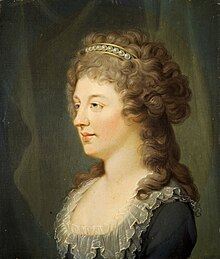Charlotte Stuart | |
|---|---|
 Portrait by Hugh Douglas Hamilton, Scottish National Portrait Gallery | |
| Born | 29 October 1753 |
| Died | 17 November 1789 (aged 36) |
| Title | Duchess of Albany |
| Partner | Ferdinand Maximilien Mériadec de Rohan |
| Children |
|
| Parents | |
Charlotte Stuart, styled Duchess of Albany[1] (29 October 1753 – 17 November 1789) was the illegitimate daughter of the Jacobite pretender Charles Edward Stuart ("Bonnie Prince Charlie" or the "Young Pretender") and his only child to survive infancy.[2]
Charlotte's mother was Clementina Walkinshaw, who was mistress to Charles Edward from 1752 until 1760. After years of abuse, Clementina left him, taking Charlotte with her. Charlotte spent most of her life in French convents, estranged from a father who refused to make any provision for her. Unable to marry, she herself became a mistress with illegitimate children, taking Ferdinand de Rohan, Archbishop of Bordeaux, as her lover.
She was finally reconciled with her father in 1784, when he legitimised her and created her Duchess of Albany in the Jacobite peerage. She left her children with her mother, and became her father's carer and companion in the last years of his life, before dying less than two years after him. Her offspring was raised in anonymity; however, as Prince Charles Stuart's only grandchildren, they have been the subject of Jacobite interest since their lineage was uncovered in the 20th century.
- ^ She was given the title in 1783 by her father, Charles Edward Stuart, who claimed to be able to grant Scottish peerages by virtue of being de jure King of Scots. Neither that claim, nor the title itself, were ever recognised by the British state. Her title was recognised by Pope Pius VI, but not, unlike other Jacobite peers, by King Louis XVI of France or Grand Duke Leopold I of Tuscany. Source: Pittock, Murray G. H. (September 2004; online edn, May 2006) "Charles Edward (1720–1788)", Oxford Dictionary of National Biography, Oxford University Press, doi:10.1093/ref:odnb/5145, retrieved 14 December 2007 (subscription required)
- ^ Pininski 2010, p. 70.